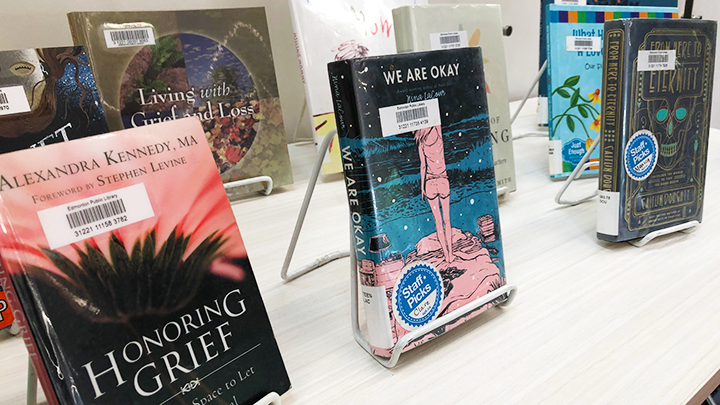
October 16, 2019

The Edmonton Public Library has been supportive in providing workshop participants with a tranquil space and several resources to help them process their emotions. Books on grief are available for participants to check out. With the help of the Human Organ Procurement and Exchange program (HOPE), the Comprehensive Tissue Centre and Spiritual Care, participants were guided in writing a letter to the recipients of their loved ones’ organs or tissues.
Story & photo by Vanessa Gomez
EDMONTON — It can be difficult to find the words to express one’s grief after the loss of a loved one. It’s a different kind of grief when your loved one lives on, in a sense, after their organ or tissue donation.
Donors’ families have a new resource to help them cope with their grief — a letter-writing workshop — where they have the opportunity to connect with the recipients of their loved ones’ organs or tissues. Organizers include the Human Organ Procurement and Exchange program (HOPE), the Comprehensive Tissue Centre and Spiritual Care.
“Families want to know about the recipients and how they’re doing,” says Margaret Lidstone, Project Coordinator for Transplant Services at the University of Alberta Hospital. “They want to tell the story of their loved ones to those recipients — and those recipients are just as inquisitive and want to know more about their donor, and if their family is OK.”
The first workshop, held in June, was well-received by families. Since then, a waiting list has grown, and the transplant program is now likely to run the workshop every few months to satisfy demand.
Capilano Branch of Edmonton Public Library (EPL) has been chosen as the meeting place, in an effort to ensure participants are not upset returning to a hospital setting. The library space — with its natural lighting and serene view of a nearby wooded ravine — relaxes participants. The library has been supportive, even setting aside books on grief for participants to check out, should they wish.
While writing the letter remains an important part of the workshop, Lidstone found the outcome somewhat surprising.
“We thought the writing was going to be more important, but it was actually the sharing,” she says. “This is a good time for them to come together and share their experiences in a non-threatening environment.” For nurse Heather Zirk, connecting with others who are going through similar circumstances has been helpful. Her husband, Dr. Harry Zirk, passed away in 2018 and was a tissue donor.
“I’ve discovered that any chance you get to talk about your own story — or hear other people’s stories — helps you process your own feelings,” she says.
During their life together in healthcare, she adds that she and her husband both appreciated the good that organ and tissue donation can do for others — and were committed to raising awareness.
“It’s a lot easier for a family to know they are acting on behalf of their loved one’s wishes,” she adds. “If anybody can learn or benefit from organ or tissue donation, we are supportive.”